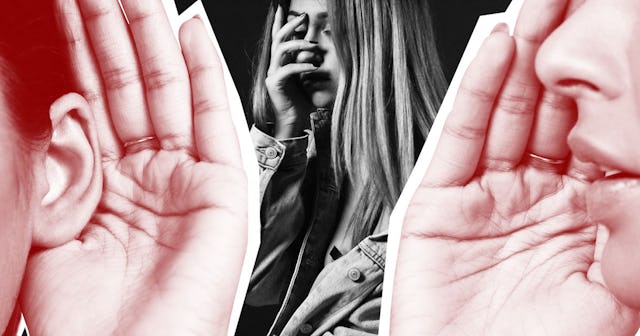When I Was Looking For Support From Other Parents, I Got Judgment Instead

School is back in session, and the “raise kind kids” posts and blogs are everywhere. I love them, I really do. Especially as a mama to a child with “special needs.” That’s the type of messaging I want to fill our homes. Kind kiddos are the classmates my daughter, and really every other student, deserve. But our kids aren’t reading our blogs. And they’re only listening to half of what we’re saying, if that. What they are doing attentively is watching us. And if we talk to our friends and neighbors the way we comment on each other’s social media posts, I can see where the “mean girl” culture we blog against emerged.
Not too long ago, I wrote a piece straight from my heart.
Having watched my daughter go from a “neurotypical” kid to one with extensive special needs, after a strep infection of all things, I struggled. I struggled with the cognitive changes she experienced, as well as the physical ones. I struggled with the fact that she went from living a comfortable and carefree life, to a more restrictive one, marked by pain and limited mobility. And I kicked myself, because caught up in the mentality of “this too shall pass,” I spent her last good, comfortable day frustrated over things that today I’d give anything for the opportunity to experience again.
And I shared that.
Not for pity – but for other mamas to know that it’s okay to let the little things go.
It’s okay if your kids’ shoes don’t match. They’ll learn, one day. It’s okay if they want ice cream for breakfast (sometimes) – and it doesn’t matter if they’re are all looking in a picture, or not. Sure, it matters in that moment. But it won’t tomorrow. Watch the joy on their faces as ice cream runs down it, or as they take off running from your picture instead of posing for it. Look on as they jump into the pool and take in their giggle. Because you aren’t guaranteed those things tomorrow.
My daughter had been sick for some time before the day I saw as her last “good” one. But she didn’t know. Two years before her body had begun attacking her brain. An autoimmune phenomenon. Because of it, she had seized to the point of lifelessness the summer before, spending it in ICU, having her blood pulled from her body and cleaned. It was a horrific experience, but one she did not remember. After, she knew she needed monthly transfusions and regular chemo to stay “healthy,” but it was just a part of life. As were the handfuls of pills keeping the seizures at bay. Her outlook on life was positive, which is probably why sometimes I, too, forgot it was so fragile.
skynesher/Getty
She was carefree. Then, unexpectedly one night she seized until her muscles contracted so tightly that she couldn’t walk. And from that day on, both by the wheelchair she required and the pain she was in, we were reminded daily that her body was working against her.
And I struggled. I struggled because she hurt, and because I didn’t take in all the moments on that last good day. I let things get under my skin that didn’t matter. I mistook perfection for happiness. I was so focused looking ahead to what I thought would be and bring happiness, I missed the beauty of the journey.
And I shared that. To get it off my chest, and with hopes it would save another mama’s heart from breaking.
Rather than finding support I found an angry swarm of mamas.
Mamas who insisted I’d implied their child who’d never had use of their legs hadn’t ever experienced a good day. Mamas saying I’d “missed the mark.” Mamas calling me “pathetic,” and discounting my experience saying, I didn’t “get it.” Mamas who were downright mean.
And it struck me. We want our kids to stand by one another. We want them to pull for the underdog. But, what do we show them? We show them a “dog eat dog” world, where we judge the way fellow mothers parent. We question what and how they choose to feed their babies, we judge what they wear, we question their discipline techniques and sleep practices, and, as I learned, we judge the emotions they experience.
But WHY?
At what age does “kind” become less cool? When do we start looking away, rather than offering a hand?
And how — in good conscience — do we do these things, then look our children in the eyes and with sincerity say, “Be a friend today?”
It’s got to change. We need to be the example. We need to lift one another up, as we expect our children to.
So often of motherhood we say, “We’re all in this together,” but we’re not.
At best we parent in silos. At worst we’re at war.
We worry more about being better than being kind. And then we wonder why our kids form cliques, gossip and hurt one another.
The change starts with us.
Let’s be who we want them to become and see what happens.
This article was originally published on